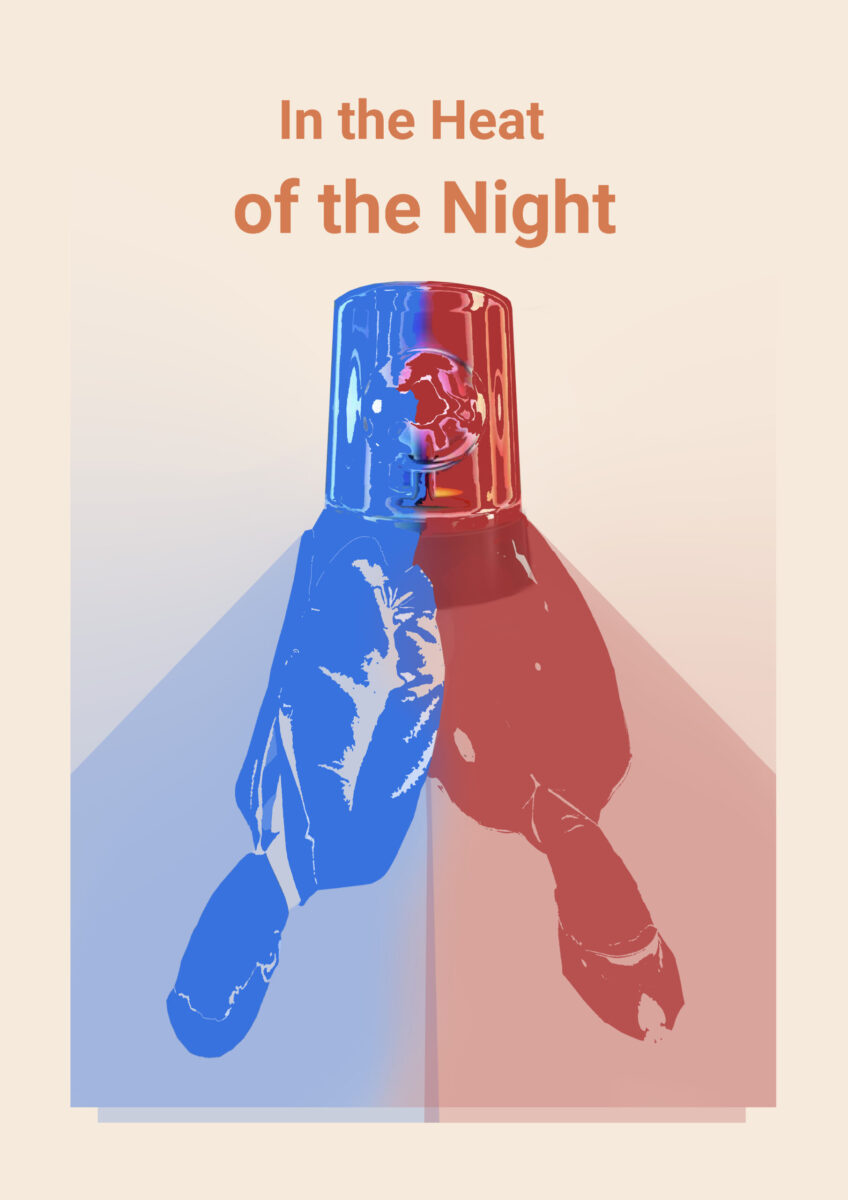Regularly referred to as an outstanding piece of movie history, In the Heat of the Night was revolutionary at the time of its release; commenting on America’s divide, economical strife and it’s not so underlying racism. Having now seen this movie, it’s not only as good as people have said, but it’s just as fitting in today’s modern-setting. A crime-drama, In the Heat of the Night (based on the book of the same name by John Ball) tells of a detective, Virgil Tibbs (played by Sidney Poitier), who on his journey through the rural town of Sparta (set in the deep south of America), is wrongly arrested for the murder of a wealthy businessman. But upon proving his innocence he’s reluctantly pulled into solving the crime, with a partner he would never want.
In a town economically struggling with the changes to America’s unskilled workforce, its population and high-officials are out to find “whoever” killed the rich businessman – for his company had promised them a life-line and still might if they catch the killer. But why did they arrest Tibbs? Was he in the wrong place at the wrong time – no, he was merely waiting at the station for his connecting train. Was he holding the murder weapon? Urrm No. Did he know the victim? Nope – for Tibbs was just passing through. In fact, there’s no reason at all, and in horrifying truth was arrested solely because he’s black. From here the film quickly shows that the town of Sparta is a place filled with racism on every street corner, including the entire police station and its Chief Bill Gillespie (Rod Steiger) who doesn’t question his subordinate’s decision to arrest Tibbs. For Gillespie it’s enough to just look at him. When at last Tibbs is given the chance to speak he calmly explains how it’s impossible for him to have committed the murder, including having no motive, but still Chief Gillespie does not care. Having tried to reason with them, Tibbs feels he has no choice but to reveal that he’s a detective, and it’s only this that stops their accusations – the scene is pure gold and will have you smiling as the police chief falls over himself in placing the blame. However, despite all this, Gillespie only begrudgingly accepts that Tibbs is innocent, and in this the film shouts that if Tibbs hadn’t been a detective, he would have been jailed and with no fair chance to defend himself against the murder charge. It’s a stark and brutal reveal.
Disgusted at the attitudes of the Sparta police and those in town, Tibbs tries multiple times to leave. I mean why would anyone want to stay there?! But each time Tibbs tries he’s called back by his strong sense of morals in solving the case, knowing that otherwise the town’s inept police force will accuse more innocent people and that the real murderer will escape. Through his investigation Tibbs changes some of the townsfolks attitudes; there’s a lovely scene when he talks to one of the men that’s been falsely arrested. Tibbs also comes prey to an assumption himself; believing a local cotton owner to be a prime suspect – based mainly on his detestable character – if only he could arrest him for that.
In Tibbs’ quest to solve the murder, he’s forced to work with Police Chief Gillespie, who in turn, is forced to work with him due to the mayor’s demands. But he also does so because deep down he knows that Tibbs is his best chance in solving the case. The pairing may be an odd-couple situation (one often played in movies); highlighting their differences, including their desire to solve the case. For Tibbs it’s to protect the law, for Gillespie it’s to help keep his job by saving the town from losing there’s – with future employment being offered in solution for the murderer. But this pairing also allows for their beautiful – if all too brief – moments of unity.
Sidney Poitier, well-known for his fantastic acting, gives one of his best performances as Tibbs; transferring his character’s emotions onto the audience. You feel the anger at his treatment, a level of anxiety in trying to be safe, and the frustrating pull of having to do the right thing. Even though it’s tempting to leave the town to self-detonate. Upstanding, honest and a law-abiding detective, you want all the rest to be like Tibbs. His values and competency shining even brighter in contrast to the failings and poor standards of Sparta’s police force – who run from one accusation to another, never taking the time in-between to investigate. Tibbs’ character shows the town’s racism (and America’s), and in doing so makes Gillespie question his own actions. When seeing how the town acts, Gillespie begins to feel the shame of his own; his closed eyes starting to open up. Gillespie gains so much from Tibbs’ presence, including some much needed detective skills, but it’s hard to see that Tibbs gains anything himself from this situation, except that maybe some people can be redeemed.
Thankfully I watched this movie alone, which was probably a good thing as I can’t remember screaming and shouting at a screen like this before. It’s unbelievable just how realistic the film is; showing how people can be prejudiced, and that communities are not only standing by and watching this, but actively participating in fuelling such unwarranted hatred. The surrounding cast of actors are of the highest standard, you never doubt that they’re as disgusting as they seem. Rod Steiger is excellent in his role as Chief Gillespie, with his character slowly revealing to the audience – and to Detective Tibbs – the many layers that form his personality, even if you don’t like some of them.
It’s easy to hope that in the film’s ending Gillespie has dropped all his previous prejudices and discrimination, for he shows not just respect, but also a possible hand of friendship to Tibbs. However for most of the film, and only a few short scenes before, he was still showing himself to be racist. But, although Tibbs may not have undone a lifetime of racism, he’s started a change in Gillespie – who’s attitude and character is a representation of some in the world – and so in this small starting of change an extremely powerful hope is carried across to the audience.
Director: Norman Jewison
Other notable works:
- The Hurricane 1999
- Moonstruck 1987
- A Soldier’s Story 1984
- Fiddler on the Roof 1971
- The Russians Are Coming! The Russians Are Coming! 1966
Scriptwriter: Stirling Silliphant
Other notable works:
- The Poseidon Adventure 1972
Based on In the Heat of the Night by John Ball











